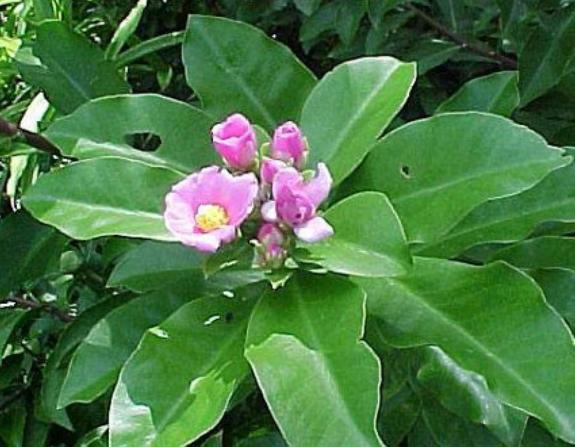

Sections
Highlight

Denise Bush
Friday, 14 September 2018, 13:18
Compartir
Pereskia is a genus of 17 species of cacti. It is very unusual as it resembles a rose more than a cactus and for this reason is often called the rose cactus. Pereskia is native to South America, from Brazil to Mexico, some species can also be found in the West Indies, and the genus includes shrubs, climbing plants and trees.
Pereskia is the only cactus that has no succulent leaves and a plant like it is thought to be the ancestor of all cacti today. The first specimens were collected in the Caribbean by Charles Plumier, a French monk and botanist, between 1689 and 1695. Known as the King's Botanist, his name was later given to the Frangipani genus, Plumeria.
Pereskia grandiflora var. violacea is a shrub or small tree which forms a rounded crown and has a spiny grey-brown trunk. The spines can be up to four centimetres long and form in clusters although they may be absent from new growth and some plants may not develop spines at all. It is evergreen in temperate climates but may lose all its leaves in colder areas.
It can be grown in full sun or partial shade, will adapt to most soils and is drought resistant once established.
The purplish or pink flowers with yellow stamens and red filaments are about 3-5cm across and form in clusters at the ends of the branches during the summer. After the blooms, the large 'winged' fruits form. These are edible but only when extremely ripe and even then large quantities can be toxic. The leaves are also said to be edible and were once used raw or in concoctions to treat cancers, headaches, haemorrhoids, atopic dermatitis and gastro-intestinal diseases.
Propagation is by woody stem cuttings or by seed, but this must be collected when the fruits are over ripe and then washed and dried before storing.
Pereskia is named after the sixteenth century French botanist Nicolas-Claude Fabri de Peiresc.
Publicidad
Publicidad
Publicidad
Publicidad
Reporta un error en esta noticia
Necesitas ser suscriptor para poder votar.